Asad Shah killing: Man admits Glasgow shopkeeper murder
- Published
Steven Godden reports: "Tanveer Ahmed believed that Asad Shah was claiming to be a prophet"
A 32-year-old man has admitted murdering a Glasgow shopkeeper in a religiously motivated attack.
Tanveer Ahmed, from Bradford in Yorkshire, attacked Asad Shah outside his store in the Shawlands area on 24 March. Mr Shah later died in hospital.
The 40-year-old was stabbed after publishing hundreds of videos about his spiritual beliefs online.
Mr Shah was an Ahmadiyya, a group known for its peaceful interfaith concerns. Ahmed said he had "disrespected" Islam.
He pled guilty to the murder at a hearing at the High Court in Glasgow. Sentence was deferred until 9 August and Ahmed was remanded in custody.
The judge, Lady Rae, said he would face a very lengthy period of imprisonment.
She told Ahmed: "This was a truly despicable crime, motivated, it seems, by your sense of offence at a man's expression of his religious beliefs, which differ from yours.
"Let me be clear - there's no justification whatsoever for what you did."
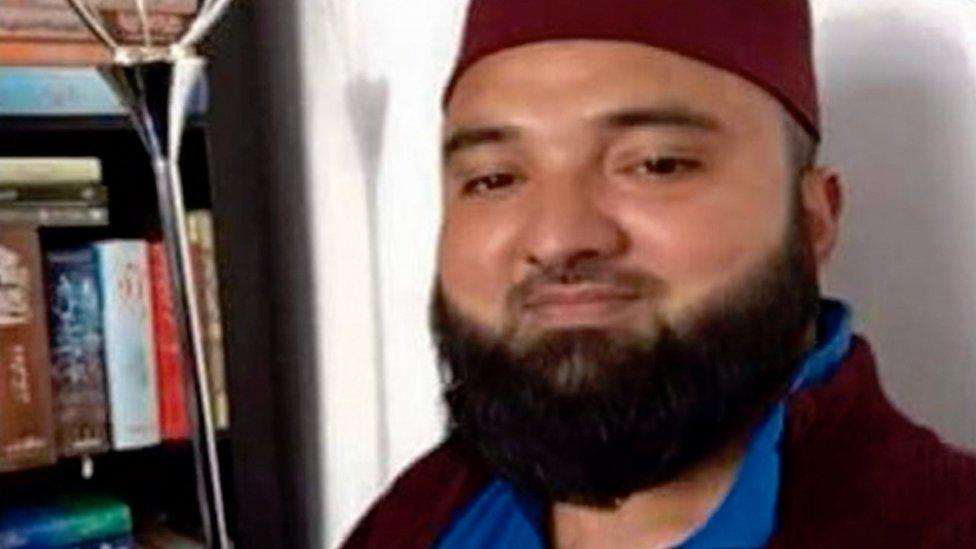
Tanveer Ahmed issued a statement in April saying Mr Shah had "disrespected" Islam
The court heard Ahmed, a cab driver, was in Glasgow a couple of days before the murder with a friend who knew Mr Shah and who showed Ahmed Mr Shah's Facebook page.
The shopkeeper had uploaded hundreds of videos about his spiritual beliefs to Facebook and YouTube, most of which were filmed behind the counter of his shop.
The court was told Mr Shah had posted some videos which could be seen as him claiming that he was a prophet.
'Offended his feelings'
Advocate depute Iain McSporran, prosecuting, said: "The accused's consistent and repeated account as to his motivation for murdering Asad Shah was that Shah claimed to be a prophet, which so offended his feelings and his faith that he had to kill him."
Ahmed, a Sunni Muslim, returned to Bradford but then drove to Glasgow on the day of the murder. On the journey, he watched online footage of Mr Shah and said: "Listen to this guy, something needs to be done, it needs nipped in the bud."
He arrived at the shop at about 21:00 where Mr Shah was working with an assistant, Stephen McFadyen.
After walking around the shop, Ahmed approached the counter and began speaking to Mr Shah.
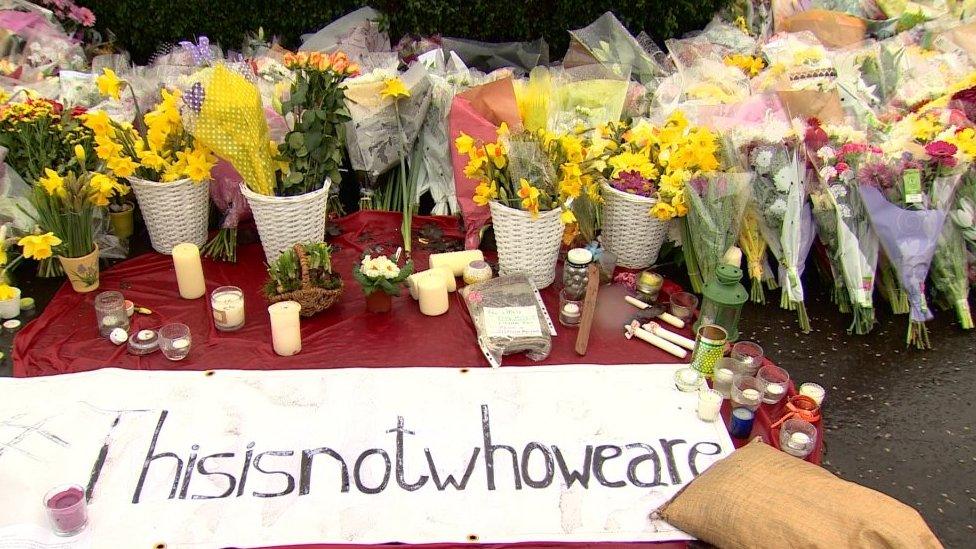
The murder of Mr Shah horrified the local community, with hundreds of floral tributes being left in his memory
Mr McSporran said: "The accused having apparently not received the response he was looking for, reaches into the robes he is wearing and removes a knife which which he attacks Asad Shah, moving behind the counter to do so.
"Stephen McFadyen, approaches and attempts to assist but the incident is fast moving and he is unable to prevent the attack, involving repeated stab wounds aimed at the head and upper body, continuing.
"Asad Shah attempted to flee his assailant and moved outside the shop but the accused kept hold of him and continued striking him with the knife."
Mr Shah was taken to hospital in Glasgow, but despite CPR and surgery he could not be saved and was pronounced dead at about 22:00.
He suffered multiple broken bones and the base of his skull was fragmented in a way more commonly seen in victims of road traffic accidents, with "numerous powerful blows" to his head and back, the court heard.

Analysis by Shaimaa Khalil, BBC News, Pakistan
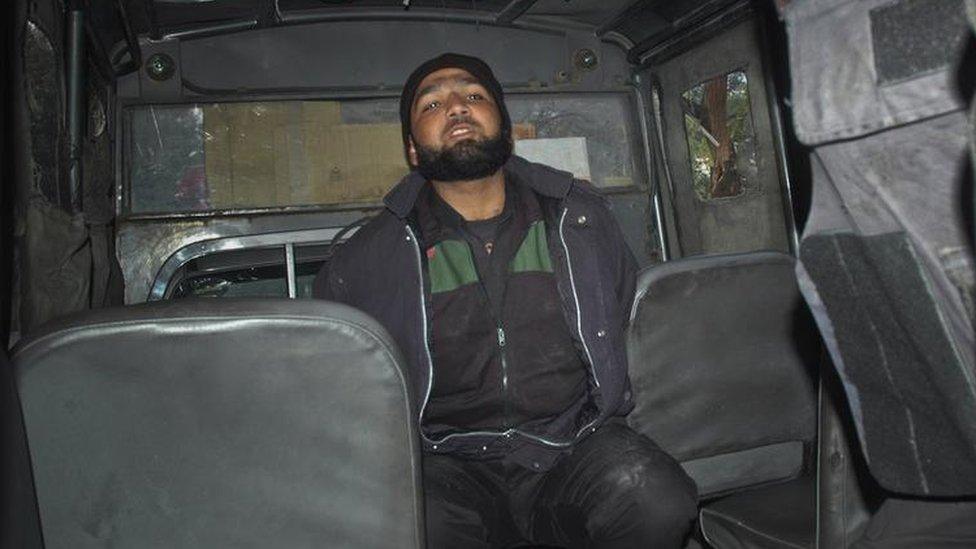
Mumtaz Qadri (pictured) is said to have inspired Tanveer Ahmed
To many in Pakistan, Mumtaz Qadri was a cold-blooded murderer. But to the tens of thousands of his supporters he was a hero who defended Islam and its prophet.
Mumtaz Qadri was hanged in February for killing the governor of Punjab Salman Taseer in 2011. Mr Taseer had spoken out against the country's blasphemy law.
Riots broke out after Qadri's funeral with many vowing to carry on the cause. One banner said: "We're all Mumtaz Qadri".
I met Qadri's brother, Dilpazeer Awan, in their family home in Rawalpindi. He said Tanveer Ahmed was one of his brother's biggest supporters.
I asked him if he thought he killed Asad Shah because his brother inspired him.
He told me: "Yes no doubt he was very much impressed by Mumtaz, he used to send him messages in jail. Let me tell you it's only Mumtaz Qadri's body which was hanged but his spirit still lives on."
Blasphemy is a capital crime here in Pakistan and while no one has ever been executed for it, dozens have been killed before their cases even made it to court.
Human rights groups have long called for a change of the law which they say is used mainly against religious minorities.
But it's a very sensitive and often life threatening subject that many people especially politicians prefer to avoid.

Mr McSporran said the nature of the attack was such that "only death could possibly have been the intended outcome".
Ahmed then calmly walked to a bus shelter and sat "head bowed as if in prayer" and made no attempt to escape.
He told the police officers who found him: "I respect what you do and I have nothing against you and so I am not going to hurt you.
"I have broken the law and appreciate how you are treating me."
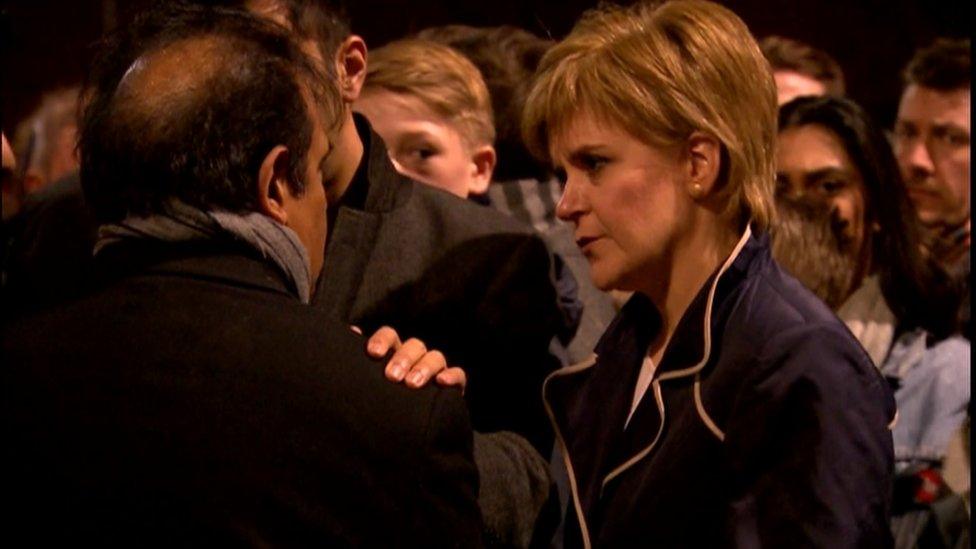
First Minister Nicola Sturgeon was among hundreds of people who attended a vigil in Shawlands following Mr Shah's death
Ahmadiyya Muslims are persecuted in many parts of the world and are banned by the constitution of Pakistan from referring to themselves as Muslims.
Mr Shah was born in Rabwah, Pakistan, but moved to Scotland after he and his family were persecuted for their faith. They were granted asylum by the UK.
On the day Mr Shah died, he had posted a message on Facebook which read: "Good Friday and a very happy Easter, especially to my beloved Christian nationx."
However, Mr McSporran stressed this specific post had no bearing on the crime.
'Mindset of hate'
After being arrested, Ahmed released a statement through his lawyer saying he had killed Mr Shah as he had falsely claimed to be a prophet.
The statement was immediately condemned by Ahmadiyya Muslim leaders, who said killing for "blasphemy" was "completely against the teachings of Islam".
"We must not let the same mindset of hate and violence take root here in Glasgow, and for that matter, the UK and anywhere in the world," they added.
Mr Shah's brother says a "monster" killed someone who was "peaceful and who wanted unity in the world"
The court heard Ahmed was not motivated by malice towards Ahmadiyya Muslims as a group, but by his offence at Mr Shah's comments.
However, a victim statement from the shopkeeper's family - his wife, parents and six siblings - said they could no longer live normal lives and some intended to leave Scotland.
His parents said: "We brought our children to this country to seek refuge from Pakistan in 1991 fleeing persecution, religious hatred, discrimination and a danger to our lives because we were Ahmadis.
"We never thought that we could be in danger here. We feel imprisoned by our pain and suffering and we have little hope of ever having a normal life again.
"Most of the family, unable to live with this turmoil, pain and fear, has taken a decision to leave Scotland forever."
'Extreme act'
The murder of Mr Shah, who was well-known in the area, shocked the local community, with Scottish First Minister Nicola Sturgeon among those to pay their respects to him.
Asst Ch Con Steve Johnson, from Police Scotland, said Mr Shah had been a "peaceful family man" who was well-liked in the community.
He added: "Mr Shah's murder was the result of an extreme act of violence; an attack which was concluded within the space of four minutes. It is clear that the actions of Tanveer Ahmed were motivated by his religious beliefs.
"There is a consensus across all of our communities that there is no place in Scotland for religious or cultural intolerance which generates crimes of hatred, intimidation or violence. Religious or cultural beliefs, no matter how strongly held, do not entitle anyone to commit murder or acts of aggression."
- Published7 July 2016
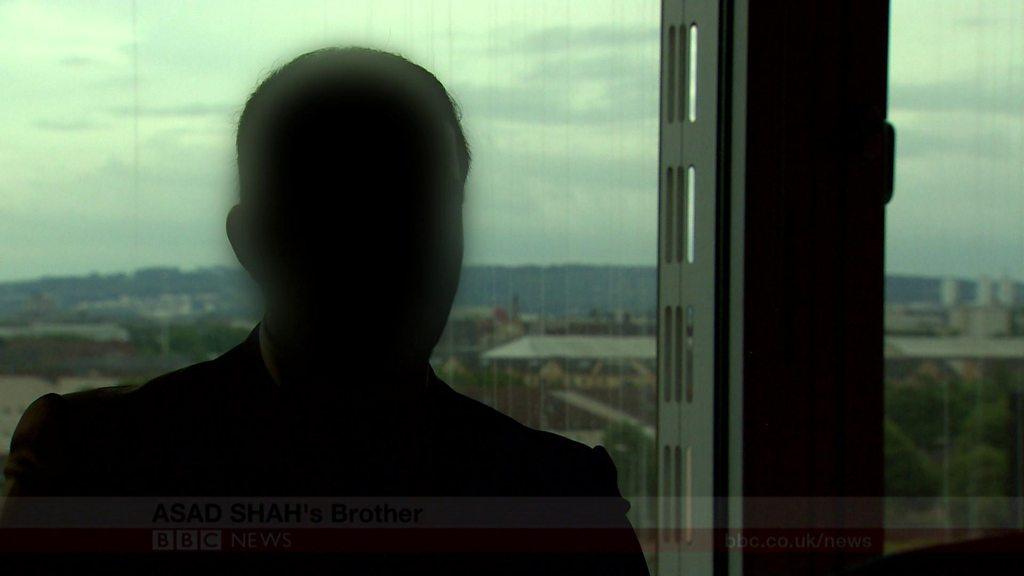
- Published2 April 2016
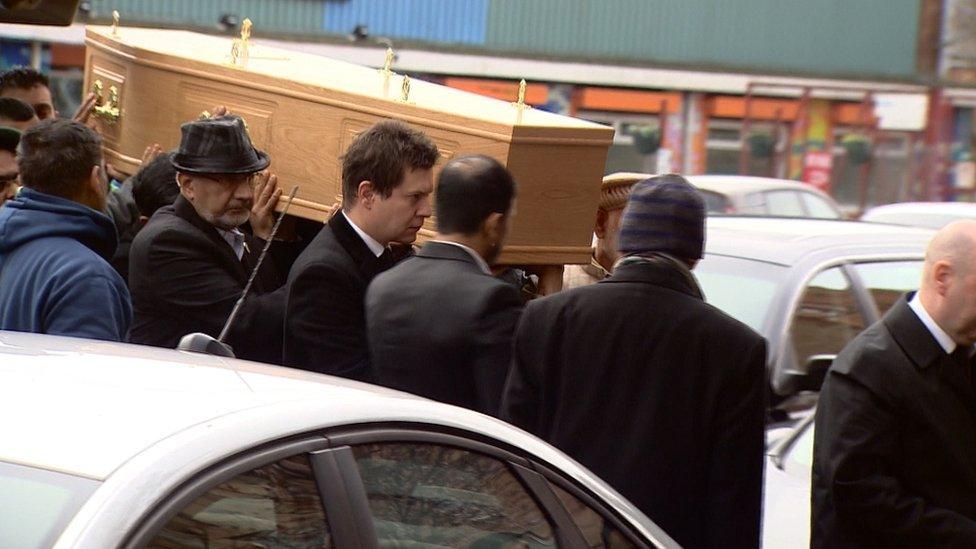
- Published29 March 2016
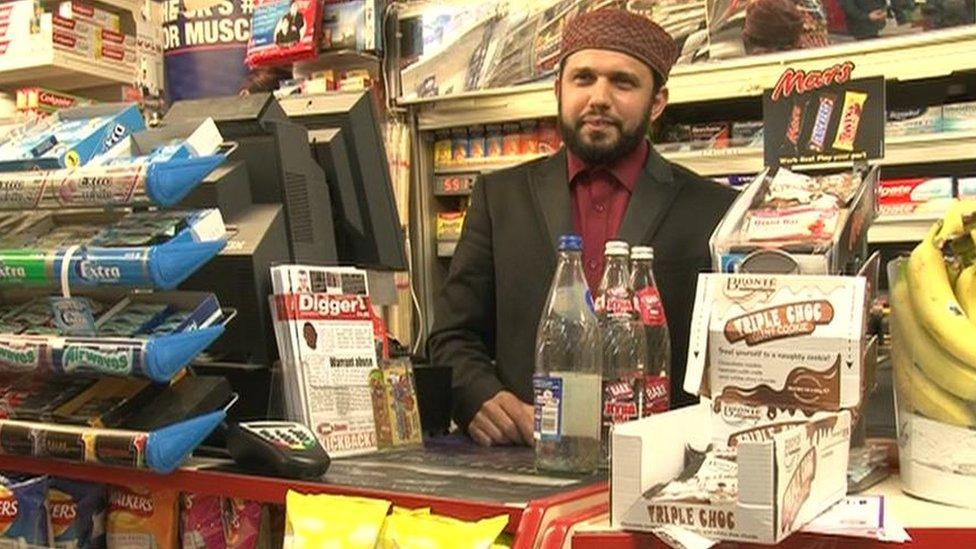
- Published26 March 2016

- Published26 March 2016
